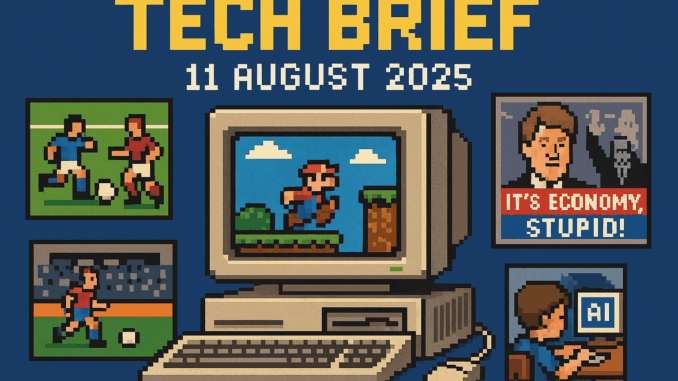
Tech Brief 11 August 2025 lines up three stories that say as much about blood-splattered nostalgia as they do about the next chapter of our digital present. Whether you’re tracking the rise of indie horror mashups or watching the debate over AI and childhood learning with a raised eyebrow, there’s plenty for the retro-aware. Missed yesterday’s Tech Brief? Catch up here before diving in.
Indie Release ‘Fear FA 98’ Blends Survival Horror and Classic British Football
“It’s not just football with blood.” The developer’s summary barely does Fear FA 98 justice. This new indie title grabs the pixelated pitch energy of Fifa 98, and bathes it in the eerie filter of Silent Hill, giving “online survival horror football” a place in the canon of truly warped genre experiments. Here, the ball is a severed head, strikers dual-wield rusty scissors, and corners can summon actual demons. Madness? Maybe. Essential retro shot in the arm? Absolutely.
Technical purists will note the choice to riff off games that defined late-nineties living rooms in Britain, not just for nostalgia’s sake, but because those quirks and limitations still lead to creative hacks and mashups. The result: a playable headache you wish Sensible Soccer had coded after a bad curry. Club together for a session, or just gawk at the Twitch clips.
TikTok Revives 90s New Labour Drama for a New Generation
Which is stranger, Gordon Brown and Tony Blair memes trending among TikTok teens, or Gen-Xers realising their formative political arguments are viral currency? Social platforms have turned the Blair-Brown rivalry into a high-stakes psychodrama, cut together with vintage news clips and digital in-jokes. The “toxic feud” of 1990s New Labour is picking up Gen-Z followers who remix British politics as if it were Sonic the Hedgehog lore or Street Fighter backstory.
It’s a jarring moment for anyone who typed furious Usenet posts in ’98 or knows the pain of a dial-up disconnect mid-political rant. Retro culture isn’t just about machines or magazine tapes, it’s history, reframed for remix. This isn’t comfortable nostalgia. It’s living evidence the past gets stranger as technology distorts it, yet all digital trails remain, waiting for rediscovery.
Concerns Grow Over AI Dependency Among Children Using Chatbots
How much help is too much? That’s the question simmering in households where primary kids now draft essays and solve sums with AI assistants like ChatGPT. Experts worry we’re raising a generation too reliant on tech, but when were we not told that? Internet access once inspired similar warnings, and before that, calculators and even the humble TV got the blame.
Today, “AI dependency” means children swapping self-directed trial and error for instant solutions. Critics highlight the risk to creativity and memory, though a counterpoint is emerging: digital natives are using these tools to learn faster and explore further. The old BBC Micro User Guide, a favourite on retro shelves, once suggested parents “set clear limits for computer use.” It turns out the debate hasn’t retreated; it’s expanded to every room with a screen.
From the Tech Time Capsule
On This Day: 1984 – IBM launches the Personal Computer AT, model 5170. The AT introduced a 16-bit Intel 80286 processor running at 6 MHz, landmark features such as a real-time clock, split BIOS chips, a theoretical 16 MB RAM ceiling (though few could afford more than 1-2 MB back then), and a 20 MB hard drive. Its open architecture made PC upgrade culture possible. This legacy lingers. Decades later, every ATX case and expansion bus nods back to IBM’s August shake-up. Some spare parts keep showing up, keen not to be forgotten.
Today’s Big Question
Tech Brief 11 August 2025 brings the old and new together: does remixing, or replaying, the past, in games or memes, mean more to us than using tech to leap forward? Or will the anxiety about losing our skills to machines finally win out?
Look after your treasured hardware and odd memories. Sometimes it’s the lopsided upgrades, bizarre headlines, and retro quirks that make tech worth keeping around.
Missed yesterday’s Tech Brief? Catch up here

Leave a Reply